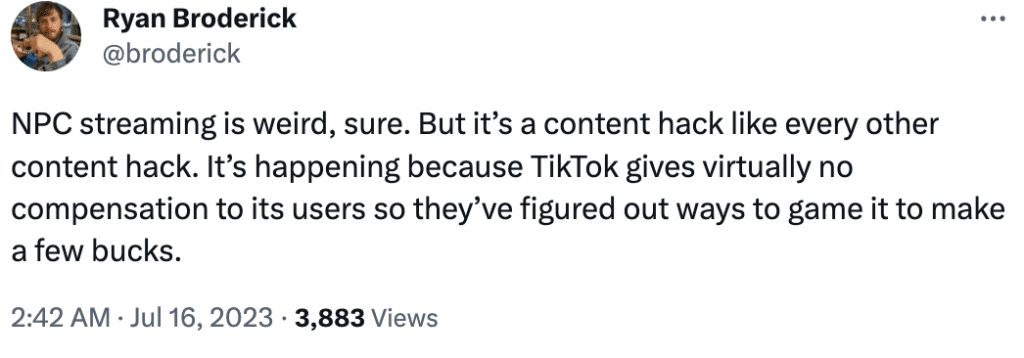
There is no denying that there is some strange content on TikTok. Whether it’s videos of glass bottles being rolled down a set of stairs or (extensive) commentary videos about blue nail polish, there really is something for everyone.
But over the past week, a new type of content has gone mainstream, and internet users have much to say about it.
A screen recording of @pinkydollreal on a TikTok live is blowing up online. In the stream, the creator can be seen popping popcorn on her hair straightener, reciting strange catchphrases and thanking her viewers for sending gifts. And if you haven’t seen this type of stream before, it can be quite confusing at first glance.
this woman is a hyper optimized window into the collective unconscious. it’s obvious that she has spent hundreds, perhaps thousands, of hours studying the exact sequences of gestures and phrases that maximize viewership and revenue pic.twitter.com/EusumXgRJk
— optimistic donkey from shrek 2 (@choosy_mom) July 13, 2023
Pinkydoll is an NPC streamer— that is, she creates content by imitating a “Non-Playable Character.”
If you’ve played a video game, you’ve definitely encountered an NPC. While players cannot manipulate these characters, they are programmed to interact with users. And with these avatars being computer-controlled, they often exhibit some pretty bizarre behaviour.
In her live streams, Pinkydoll mimics NPCs through repetitive movements and phrases like “gang gang” and “mm, coconut so good” each time a viewer sends a gift or writes a comment. While such behaviour may not faze gamers, some internet users have found her communication style to be odd in the context of a TikTok livestream— questioning why people enjoy this content and why she continues to make it.
I think people are *really* overreacting to those TikTok lives lol. Like the point is clearly to act like a NPC from a dating sim. Its fine! It’s a bit odd for sure! But the outrage around it honestly just reminds me of when people discovered ASMR videos and lost their minds lol
— Megan Rose Ruiz (@meganroseruiz) July 17, 2023
For Pinkydoll, NPC streaming is lucrative. When viewers send gifts, it boosts the stream’s popularity and can even translate into monetary rewards for the creator.

According to TikTok’s support page, “Through LIVE Gifts, you can collect Diamonds, which are awarded based on the popularity of your LIVE videos…As a creator, one way you can collect Diamonds is to receive Gifts from viewers on your LIVE videos. Once you collect Diamonds, you may obtain a Reward Payment in money or in virtual item.”
To be able to gift creators, users must be 18 years or older and purchase coins through the TikTok app. While the cost varies between currencies, Twitter user @TrungTPhan found that one TikTok coin is approximately worth 1.3 cents in the United States. With gifts ranging from one coin to several hundred, Pinkydoll has the potential to earn thousands of dollars within minutes.
“That wild TikTok live performer vid makes so much more sense when you see the pricing of the gifts,” @TrungTPhan writes. “‘GangGang’ and ‘Ice Cream’ are the cheapest (1 coin) while ‘Hat and moustache’ break the bank (99 coins).”
With the creator choosing to respond to each user who sends a gift, it’s clear that Pinkydoll has figured out how to maximise the monetary benefits of NPC streaming.
A TikTok coin is worth ~1.3 cents: https://t.co/MXjigmPA9c
— Trung Phan (@TrungTPhan) July 14, 2023
The gifts are showered on the live-streamer. PinkyDoll could get 1000 “hat and moustaches” in a few minutes and be done for the day: https://t.co/fVRiNpFduL pic.twitter.com/9DZNkvHVBO
But that doesn’t explain why viewers want to shell out cash for gifts.
Numerous TikTok users have noted how NPC streaming is widely considered a form of fetish content. In a video posted by entertainment company eBaum’s World, @dietz_meredith explains that a “control fetish” is why some users continue to gift creators like Pinkydoll.
“Sure, shock value gets you views, but how does a creator monetise that…Every time a little icon was popping up on the screen, that creator was receiving donations in return for doing a requested action,” Meredith explains. “Enough people out there have something of a ‘control fetish,’ and that drives them to donate in exchange for feeling like they are controlling this real human, like their own personal video game character.”
@ebaumsworld If tiktok lives feel like a fever dream then baby i dont wanna wake up🤪 #tiktoklive #pinkydoll #cherrycrush #fartjar @meredith
♬ original sound – eBaum’s World
Though Pinkydoll’s streams are not overtly sexual, the fact that she continues to cater to this demographic has unsettled internet users— with some questioning why she would “degrade” herself for popularity and financial gain.
Many TikTok users have even gone on to mock Pinkydoll’s content, starting their own streams and mimicking her NPC-speak.
So you mean after men insult and mock women for doing funny things and pursuing our interests on livestreams, they secretly are jealous and money hungry so they copy and do the exact same thing???
— Belly Cheeks 🌕 (@sugabelly) July 15, 2023
This man is just duplicating PinkyDoll bar for bar. pic.twitter.com/6pjCOfin3M
Internet culture journalist Kat Tenbarge has since stepped in to defend the creator, highlighting the double standards that many of these viewers hold.
She argues that male creators, like the Paul Brothers, have long engaged in “lowbrow stunts” to grow their online presence. But instead of facing backlash like Pinkydoll, they have received mainstream praise for their business acumen and success.
“It’s funny how tech guys approved of boys and young men using social media to make money by doing the most humiliating, lowbrow, and offensive stunts possible for attention and clicks, but when women do the same thing, the tech guys are like oh my god the world is ending!!” she writes in a Tweet.
It’s funny how tech guys approved of boys and young men using social media to make money by doing the most humiliating, lowbrow, and offensive stunts possible for attention and clicks but when women do the same thing the tech guys are like oh my god the world is ending!!
— Kat Tenbarge (@kattenbarge) July 16, 2023
Journalist Ryan Broderick of the Garbage Day Substack made a similar argument— noting how the men posting NPC content on TikTok are receiving nowhere near the level of criticism and hate as Pinkydoll.
Responding to a screenshot of a Twitter user describing her content as ‘heartbreaking,’ Broderick writes, “You know there are a lot of men doing NPC streaming on TikTok too? It’s funny how no one is shrieking about the dudes dressed like Spider-Man doing the exact same stuff, isn’t it? Makes you wonder.”
You know there are a lot of men doing NPC streaming on TikTok too? It’s funny how no one is shrieking about the dudes dressed like Spider-Man doing the exact same stuff isn’t it? Makes you wonder. https://t.co/j1YKx5SsZk
— Ryan Broderick (@broderick) July 15, 2023
Broderick and Tenbarge point to an important yet unfortunate point: social media users seem to find this type of content problematic when it involves a woman who exercises her agency.
From the rise of companion chatbots to deep fake pornography, women have long been objectified and sexualised online— often without consent. But, when creators like Pinkydoll choose to leverage their sexuality for financial gain, it invites a whole new level of mockery and degradation.
In Tenbarge’s own words, “Women cannot exist on the internet being silly and goofy without people being like, oh she’s a literal attention whore like my god, you cannot win as a woman.”
It’s also like yeah some of it is fetish content but also women cannot exist on the internet being silly and goofy without people being like oh she’s a literal attention whore like my god you cannot win as a woman
— Kat Tenbarge (@kattenbarge) July 16, 2023
While Pinkydoll’s content may not be for everyone, she is not the first creator to engage in such streams, nor will she be the last.
With that said, it’s disheartening to see criticism directed towards a woman who, like many men before her, has found a way to use TikTok’s live stream function to her advantage— especially when patriarchal norms make it all the more difficult for women to create this kind of content safely.

